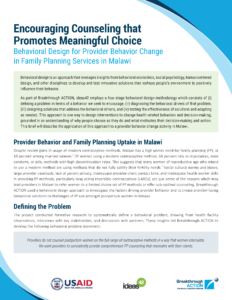Despite recent gains in the use of modern contraceptive methods, Malawi has a high unmet need for family planning (FP), at 19% among married women. Of women using a modern contraceptive method, 60% rely on injectables, male condoms, or pills, methods with high discontinuation rates. This suggests that many women of reproductive age who intend to use a modern method are using methods that do not fully satisfy their fertility needs. Social-cultural norms and biases, large provider caseloads, lack of patient privacy, inadequate provider-client contact time, and inadequate health worker skills in providing FP methods, particularly long-acting reversible contraceptives, are just some of the reasons which may lead providers in Malawi to refer women to a limited choice set of FP methods or offer sub-optimal counseling. Breakthrough ACTION used a behavioral design approach to investigate the factors driving provider behavior and to create provider-facing behavioral solutions to challenges of FP use amongst postpartum women in Malawi.



